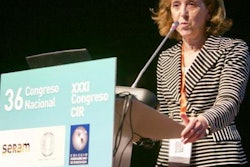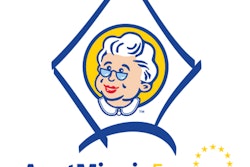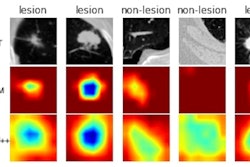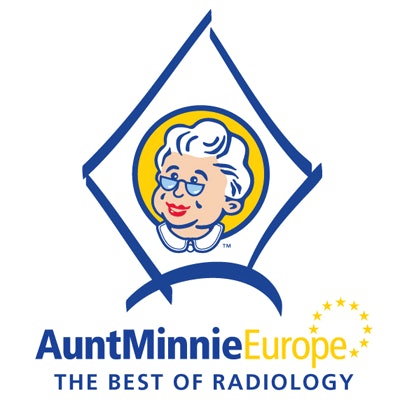
Women have dominated the 2020 EuroMinnies award scheme, collecting the prizes for Most Influential Radiology Researcher, Most Effective Radiology Educator, Radiology Rising Star, and Scientific Paper of the Year. Germany, Spain, Portugal, and Norway have provided the winners in these four categories.
Dozens of nominations were received from members of AuntMinnieEurope.com in December 2019, and after two rounds of voting and considerable deliberation, the judging panel for the second edition of the EuroMinnies has decided on the winners in eight categories, including three industry awards. Below is a full listing of their selections.
The trophy presentations will take place at ECR 2020 in Vienna, and we will be posting photos of the award winners during the congress, which begins on 11 March.
Most Influential Radiology Researcher
EuroMinnies 2020 winner: Prof. Dr. Christiane Kuhl, PhD, RWTH Aachen University Hospital, Aachen, Germany
Prof. Dr. Christiane Kuhl, PhD, has championed breast MRI with immense enthusiasm, intelligence, and passion since 1994, conducting many of the important studies in the field. She has been driven by an unshakable belief in the technique's clinical value and future.
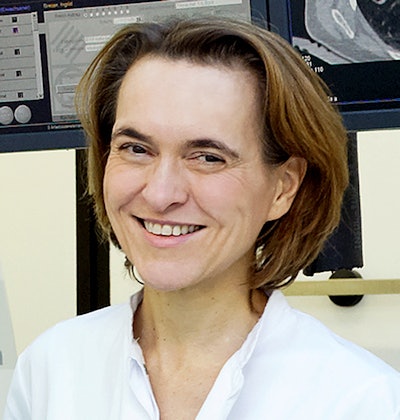 Prof. Dr. Christiane Kuhl, PhD.
Prof. Dr. Christiane Kuhl, PhD."Research has always been a big part of my life -- as has been care for the patient and teaching young radiologists," she told AuntMinnieEurope.com.
"As a researcher, you can help shape how medicine works. As a clinical radiologist, you can help shape the way an individual patient is treated. As a radiologist, you are a clinician who should act accordingly, and take direct responsibility for your patient. It is this kind of radiology that I represent and that is being recognized here," she explained.
She has worked as the director and head of the department of diagnostic and interventional radiology at Aachen since 2010, being responsible for 120 staff members, and is one of only two female heads of radiology at university hospitals in Germany. She was the vice chair of radiology at the University of Bonn between 2004 and 2010, having become a full professor of radiology in 2004.
Kuhl usually has a working day of over 12 hours, spending about 20% of her time on research, 30% on clinics, 40% on running the department, and 10% on other tasks, including grant or paper reviewing, contributing to scientific and radiological societies, and faculty obligations.
Her first research project involved phosphorus-31 (P-31) MR spectroscopy of neuromuscular disorders, and she carried out research in high-field MRI and neuroradiology between 2000 and 2009. She also has extensive experience in prostate MRI, hepatobiliary MRI, and interventional oncology procedures.
Kuhl's main advice to radiologists who want to do research is to find a topic that fascinates and thrills them.
"Start your research with simple things -- to allow you to learn how to do research, how to write a paper and present it," she said. "My most important message to young radiologists is: With your work, you can make a difference."
She remains convinced that breast MRI is a viable alternative for population-wide breast and prostate screening if combined with dedicated MRI systems optimized for the respective clinical task and ensuring fast patient throughput. Breast and prostate cancer are the first candidates for abbreviated MR screening, she said. She is co-principal investigator of the EA1141 trial that is comparing abbreviated MRI and digital breast tomosynthesis in cancer screening in women with dense breasts. Around 1,450 participants have been recruited at 47 U.S. centers and one European one (Aachen), and the results will be published in the Journal of the American Medical Association this week, with Kuhl serving as senior and corresponding author.
Kuhl believes strongly that radiologists should also have a full and colorful private life, and that it is the best remedy against burnout. Soon we will publish an article on AuntMinnieEurope.com about her own life outside of radiology.
Runner-up: Prof. Dr. Mathias Prokop, PhD, Radboud University, Nijmegen, the Netherlands
Most Effective Radiology Educator
EuroMinnies 2020 winner: Prof. Dr. Laura Oleaga Zufiría, PhD, European Diploma in Radiology (EDiR) & Hospital Clinic of Barcelona, Barcelona, Spain
Prof. Dr. Laura Oleaga Zufiría, PhD, has dedicated herself to teaching during her career, participating actively in the training programs for residents and in multiple courses dedicated to education.
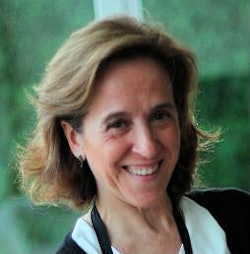 Prof. Dr. Laura Oleaga Zufiría, PhD.
Prof. Dr. Laura Oleaga Zufiría, PhD.She was vice president of the Spanish Society of Medical Radiology (SERAM) from 2002 to 2006 and chair of the Scientific Committee of SERAM from 2006 to 2008. She was chair of the Education Committee of the European Society of Radiology (ESR) from 2015 to 2018 and became scientific director of the EDiR in 2018. She also works actively in the harmonization of education in Europe.
"I am extremely proud to be receiving this award," Oleaga told AuntMinnieEurope.com. "I feel especially honored because it is an award devoted to education, which is the most powerful instrument to achieve quality in radiology and improve patient care."
"I feel it as a collective award to all those who are dedicated to training; it drives us to continue working and investing in this field," she continued. "It is a great honor that I would like to share and extend to all the people I have been working and collaborating with to improve education and training in radiology."
Born in Oñate, Guipúzcoa, Spain, Oleaga obtained her medical degree from the Autonomous University of Madrid School of Medicine, and she trained in radiology at the Hospital Donostia in San Sebastian before becoming a research fellow in MRI at the University of Pennsylvania. She worked as an MRI specialist in the Hospital of Basurto, Bilbao, and completed a doctorate at the University of the Basque Country. She became chair of radiology at the Hospital Clinic of Barcelona in 2009. Her main scientific interests are in neuroradiology and head and neck imaging.
To date, more than 4,000 candidates from all over the world have taken the EDiR examination since its inception in 2011, with a pass rate of 66%. Over 900 candidates will be taking the EDiR examination in 2020 in cities such as Vienna (during ECR 2020); Paris; Warsaw, Poland; Barcelona; Örebro, Sweden; Ankara, Turkey; Islamabad; Cairo; Moscow; and New Delhi.
"EDiR is the perfect way for radiologists to consolidate the knowledge gained during their training," she remarked. "Especially for young radiologists, preparing for the EDiR not only means taking a step further in their professional careers but also receiving a boost of self-confidence."
Runner-up: Dr. Erik Ranschaert, PhD, European Society of Medical Imaging Informatics & ETZ Hospital, Tilburg, the Netherlands
Radiology Rising Star
EuroMinnies 2020 winner: Dr. Luísa Costa Andrade, Champalimaud Foundation, Lisbon, Portugal
Dr. Luísa Costa Andrade arrived on the European radiology scene in 2015, when she was appointed secretary and board member of the ESR Radiology Trainees Forum (RTF).
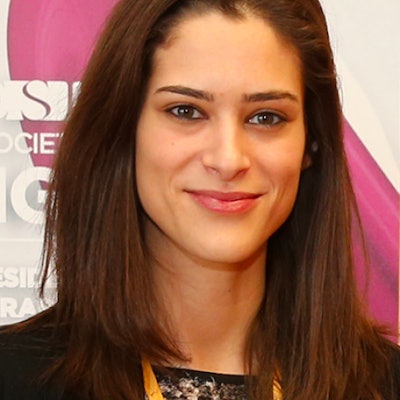 Dr. Luísa Costa Andrade.
Dr. Luísa Costa Andrade."The main achievement was the approval of the terms of reference by the executive board of the ESR, which gave the RTF the status of an ESR subcommittee," she explained. "Other achievements were the direct representation of the RTF on various ESR committees and subcommittees, the successful conduct of several surveys with a high number of participants, collaboration with the ESR Education Committee in the review of the internship and undergraduate curricula, and improving and promoting the e-learning platform as well as the Invest in the Youth and Rising Stars programs."
Costa Andrade was president of the National Portuguese Committee of Radiology Residents from 2014 to 2016 and a member of the Portuguese Committee of Radiology Residents from 2012 to 2016. She has been a member of the abdominal section of the Portuguese Radiological Society since May 2017.
Costa Andrade completed her radiology training in 2016 at the Hospital and University Center of Coimbra, after which she had spells at the Hospital Particular Alvor (HPA group) in Alvor, Portimão, and the University Hospital Centre of the Algarve, Portimão/Faro.
Her overseas experience has been invaluable. In 2015, she completed a two-month fellowship on abdominal MRI at the Academisch Ziekenhuis Maastricht (azM) in Maastricht, the Netherlands. She specialized in research on diffusion-weighted MRI of rectal cancer and colorectal-liver metastases. Also in 2015, she did a three-month fellowship on abdominal and digestive MRI at Hôpital Erasme, Université Libre de Bruxelles, Brussels.
Costa Andrade is now a gastrointestinal radiologist and a member of the Pancreas Fast Track program (multidisciplinary team) at the Champalimaud Foundation, a private biomedical research foundation created in 2004 after the death of entrepreneur António de Sommer Champalimaud. It undertakes research in the fields of neuroscience and oncology, and the Champalimaud Clinical Centre provides specialized treatment for cancer patients.
In an interview with ESR, she listed her mentors as Prof. Filipe Caseiro Alves from Coimbra, Prof. Regina Beets-Tan from Amsterdam, and Prof. Celso Matos from Lisbon, and she said she has been inspired by the ECR, particularly the European Excellence in Education program and the Rising Stars program for residents and students.
"The Invest in the Youth program allows several interns to have the opportunity to make their work known and to be present at one of the largest radiology congresses in the world and assumes itself as one of the ECR's greatest assets," she added.
Runner-up: Dr. Tsvetelina Teneva, Medical University of Varna, Varna, Bulgaria
Most Significant News Event in European Radiology
EuroMinnies 2020 winner: European societies join in ethical statement on artificial intelligence
In 2019, seven European and U.S. societies came together to produce a new statement calling for codes of ethics and practice governing the use of artificial intelligence (AI). They agreed that the ethical use of AI in radiology must promote well-being, minimize harm, and ensure the benefits and harms of AI are distributed justly among the possible stakeholders. The aim was to promote use of AI that helps patients and block the use of radiology data and algorithms for financial gain.

"We believe AI should respect human rights and freedoms, including dignity and privacy," the authors wrote in the final statement. "It should be designed for maximum transparency and dependability. Ultimate responsibility and accountability for AI remains with its human designers and operators for the foreseeable future."
The document contains details about specific ethical considerations related to data, algorithms, and practice. Establishing these regulations, standards, and codes of conduct to produce ethical AI means balancing the issues with appropriate moral concern, and achieving ethical AI will require all parties to gain trust in the technology.
"To ensure the safety of patients and their data, AI tools in radiology need to be properly vetted by legitimately chosen regulatory boards before they are put into use," the authors noted. "This requires both radiology-centric AI expertise and technology to verify and validate AI products."
They also emphasized the need to continuously update and monitor the regulations and codes of conduct and regularly reassess this topic. They realize an important start has been made, but the job is not yet complete.
Since this event, the European Union (EU) has unveiled strategies for artificial intelligence and the "data economy," with ethics and transparency being among the buzzwords. The EU's White Paper on Artificial Intelligence is open to public consultation up to May 2020. Ethics in AI looks set to remain a hot topic in the months and years to come.
Runner-up: Health bosses say shortage of radiologists puts lives at risk in U.K.
Scientific Paper of the Year
EuroMinnies 2020 winner: Do you recommend cancer screening to your patients? A cross-sectional study of Norwegian doctors. Bringedal B et al, BMJ Open, online 30 August 2019
The pros and cons of cancer screening has been an area of great controversy for many years now -- and not just for those within medical imaging.
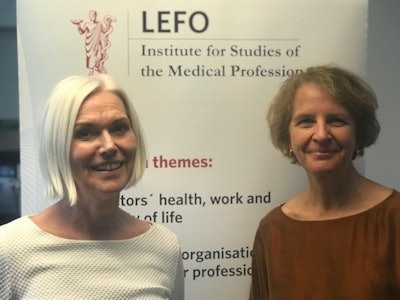 Berit Bringedal, PhD, (left) and her colleague Dr. Karin Isaksson Rø, PhD, a specialist in occupational health. Image courtesy of Berit Bringedal, PhD.
Berit Bringedal, PhD, (left) and her colleague Dr. Karin Isaksson Rø, PhD, a specialist in occupational health. Image courtesy of Berit Bringedal, PhD."Our interest is primarily in how doctors relate to evidence, as well as how to tackle potentially contradictory expectations," explained lead author Berit Bringedal, PhD, a sociologist and senior researcher at the LEFO-Institute for Studies of the Medical Profession in Oslo. "Screening for cancer is a 'hot topic' and, for some cancers, the evidence is unclear. What do doctors do in this situation?"
She thinks that the group's BMJ Open paper represents a triumph for multidisciplinary cooperation. "We had a great collaboration and benefited much from our different disciplines and specialities."
Bringedal said she felt very honored that she and her colleagues had been recognized with the EuroMinnies award by experts in radiology. She hopes the prize will now serve to increase awareness of and interest in the group's research.
"We are working on several new papers at the moment. Karin Rø and I are collaborating on one about how doctors relate to social inequalities in health, and another one on whether patients' lifestyle should have any consequences for priority to healthcare. Those two will be submitted shortly," Bringedal noted.
Two additional papers have been submitted to journals and are under revision. The first one focuses on how general practitioners manage their task as gatekeepers -- especially when it comes to saying no. The second paper is about stress among medical doctors. Finally, the group has written two chapters in a book that will be published in the summer of 2020. Both chapters concern aspects of professional satisfaction, quality of treatment, and how healthcare is governed and organized.
LEFO is concerned with all aspects of doctors' professional life, according to the institute's website. It studies doctors' health, work and quality of life, societal and organizational conditions for professional work, ethics, professional values and prioritization, and the changing roles of medical doctors.
Runner-up: Swedish national survey on MR safety compared with CT: A false sense of security? Hansson B et al, European Radiology, online 13 December 2019
Best New Radiology Device
EuroMinnies 2020 winner: Revolution Maxima CT scanner, GE Healthcare
Unveiled at the RSNA 2019 annual meeting in Chicago, Revolution Maxima is a high-performance scanner designed to optimize CT workflow. The machine will be making its debut at ECR when the doors of the exhibit hall spring open on 11 March.
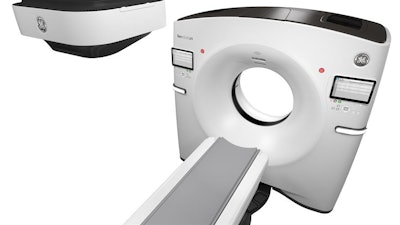 Revolution Maxima will make its debut at ECR when the exhibition opens on 11 March. Image courtesy of GE Healthcare.
Revolution Maxima will make its debut at ECR when the exhibition opens on 11 March. Image courtesy of GE Healthcare."We are very proud of our Revolution Maxima system and are honored for it to be named Best New Radiology Device in the 2020 EuroMinnies awards," said Mike Barber, president and CEO of Molecular Imaging and Computed Tomography (MICT) at GE. "With Auto Positioning, Revolution Maxima is a great example of how integrating artificial intelligence can streamline workflow and transform the entire CT experience."
Using a patient-positioning system, the scanner can automatically center patients undergoing a CT scan with a single click. To perform this task, it uses a depth-sensing camera to generate in real-time a 3D image of an individual lying on the scanner bed. Auto Positioning then uses a deep-learning algorithm to identify the center of the scan range, align it with the isocenter of the bore, and finally center the patient automatically.
The technology aims to improve the accuracy and efficiency of patient positioning and provide the technologist with more time to focus on other aspects of patient care. Early case studies from China have reported single sites scanning roughly 60 patients per day and as many as 17 patients in a single hour.
Revolution Maxima received 510(k) clearance from the U.S. Food and Drug Administration (FDA) in 2019, and the manufacturer also has obtained the CE Mark for the device. The FDA gave its approval to Auto Positioning in January 2020.
Runner-up: Artis icono interventional angiography system, Siemens Healthineers
Best New Radiology Software
EuroMinnies 2020 winner: AI Workflow Suite, Philips Healthcare
Initially called the IntelliSpace AI Workflow Suite, the software has recently been renamed, with "IntelliSpace" having been dropped from the product's name.
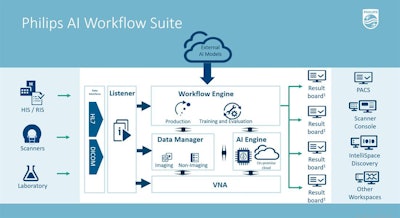 Leiden University Medical Center in the Netherlands has agreed to be the first site to install the AI Workflow Suite. Image courtesy of Philips Healthcare.
Leiden University Medical Center in the Netherlands has agreed to be the first site to install the AI Workflow Suite. Image courtesy of Philips Healthcare."On behalf of the team, I'm very proud that our AI Workflow Suite has won the 2020 EuroMinnie for Best New Radiology Software," said Dr. Michael Perkuhn, general manager of the AI Workflow Suite at Philips. "We launched the suite at RSNA with a host of leading AI algorithm partners, and we've received very positive responses from customers, both for the comprehensiveness of the platform and its centralized workflow management capabilities."
The product reflects Philips' efforts to integrate artificial intelligence into the imaging workflow. It features a set of applications for integration and centralized workflow management of AI algorithms, and it is designed to integrate into existing hospital and departmental infrastructure to take care of the routing of clinical data to the appropriate AI application, enabling algorithms to analyze data without requiring user interaction, according to the vendor.
The software automatically displays the results for the users; structured results are delivered where they're needed in the enterprise. It is designed to support the training of site-specific AI applications based on local data. Although it will integrate with Philips imaging systems and informatics software, AI Workflow Suite will also work with imaging equipment from other vendors, the company said.
It will also include a marketplace of apps for users. Philips has signed on algorithm developers Aidoc, MaxQ AI, Quibim, Riverain Technologies, and Zebra Medical Vision as initial partners for the AI Workflow Suite. The early focus is on algorithms for radiology applications, but the vendor would like to expand in the future to cardiology, pathology, and other areas.
The plan is for a commercial launch of AI Workflow Suite in 2020, and it will be on display at ECR next month. In late 2019, Leiden University Medical Center in the Netherlands agreed to become the first to install the platform.
Runner-up: AI-Rad Companion Brain MR software, Siemens Healthineers
Best New Radiology Vendor
EuroMinnies 2020 winner: Smart Reporting, Munich, Germany
This award category is open to companies that were established in the five years up to 2019, so having been founded in 2014 as a spin-off from the Ludwig Maximilian University of Munich, Smart Reporting only just met the qualification criteria.
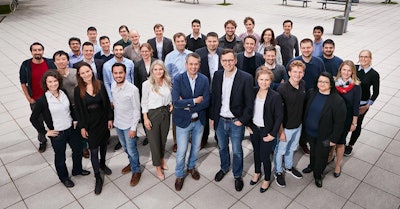 The company has around 40 staff members and brings together clinicians and software engineers. Image courtesy of Smart Reporting.
The company has around 40 staff members and brings together clinicians and software engineers. Image courtesy of Smart Reporting."Receiving this recognition means a great deal -- not only to me as a radiologist but to our entire team," CEO and managing partner Prof. Dr. Wieland Sommer told AuntMinnieEurope.com. "It's a sign that we're on the right track and a great motivation for us going forward!"
The company brings together clinicians and software engineers to develop a product that is rooted in a deep understanding of clinical needs and workflows, he explained. Back in 2014, structured reporting was just a buzzword, and the marketplace was lacking solutions. For a long time, there had been little change in how radiologists wrote their reports.
"People have talked about big data in medicine for the last 10 years, and for four years, everybody has talked about AI, but there is this huge discrepancy between the vision of data-driven medicine and unstructured workflow, where free-text dictation is the current standard in nearly all departments," Sommer said.
At the outset, Smart Reporting was a platform for structured reporting, but now it combines a reporting tool with AI algorithms to enable semiautomated workflows, e.g., for lung cancer screening. The firm has more than 8,000 users from over 90 countries, and its platform is also integrated by most large vendors, he added.
"There is a huge opportunity to bring radiology to the next level, and we have seen a huge increase of demand for our solution in the last two years," Sommer noted. "Standardization and quality control of reports, optimizing workflows in terms of efficiency, and making reports 'data-mineable' -- all those points require new forms of radiology reporting."
Runner-up: Contextflow, Vienna, Austria





